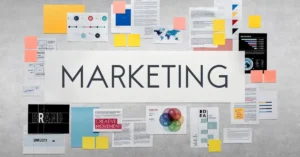Digital marketing is also known as online marketing. The term digital marketing refers to the use of websites, apps, mobile devices, social media, search engines, and other digital means to promote and sell products and services. Digital marketing started to become popular with the widespread adoption of the internet in the 1990s.
KEY TAKEAWAYS:
- Digital marketing promotes products and services through channels such as websites, mobile devices, and social media platforms.
- Digital marketers have a number of tools to measure the effectiveness of their campaigns.
- One of the biggest challenges digital marketers face is how to set themselves apart in a world that is oversaturated with digital ads and other distractions.
How Digital Marketing Works?
- To be successful, it requires a combination of advertising and sales savvy. Professional marketers take on these tasks either internally at individual companies or externally at marketing firms that may serve many different clients.
- Companies once focused on marketing through print, television, and radio because that was all they had.
- Although those options still exist, the internet gave companies another way to reach consumers and gave rise to digital marketing.
- The new technologies and trends forced companies to change their marketing strategies and rethink their budgets.
- Email became a popular marketing tool in the early days of digital marketing.
- Then the focus shifted to search engines like Netscape, which allowed businesses to tag and keyword items to get themselves noticed.
- The development of social platforms like Facebook made it possible for companies to track user data and deliver their messages to very specific audiences.
- Smartphones and other portable devices now make it easier for companies to market their products and services to consumers wherever those consumers happen to be. A 2022 Pew Research Center study found that 76% of American adults had made online purchases using their phones.
Types of Digital Marketing Channels:
Digital marketing channels have evolved since the 1990s and continue to do so. Here are eight of the most common channels in use today.
- Website Marketing
- Pay-Per-Click Advertising
- Content Marketing
- Email Marketing
- Social Media Marketing
- Affiliate Marketing
- Video Marketing
- Text Messaging
Website Marketing:
- Website marketing is the process of using the internet to promote your business and attract potential customers.
- The goal of website marketing is to increase your online visibility, generate more traffic, and convert more leads into sales.
- Website marketing can help you reach a wider audience, establish your brand identity, and grow your business online.
Pay Per Click Advertising:
- Pay-per-click (PPC) advertising enables marketers to reach audiences on news and other websites and digital platforms through paid ads.
- Marketers can set up PPC campaigns on Google, Bing, LinkedIn, X (formerly Twitter), Pinterest, and Facebook and show their ads to people searching terms related to their products or services.
- These campaigns can segment users based on their demographic characteristics (such as age or gender), or their particular interests or location.
Content Marketing:
- The goal of digital content strategy is to reach potential customers through the use of written, visual, or video content that interests them.
- That content is usually published on a website and then promoted through social media, email marketing, search engine optimization, or even pay-per-click campaigns.
- Content marketing attempts to be more subtle than advertising, and the product or service the sponsor is attempting to market may or may not be conspicuously highlighted.
Email Marketing:
- Email marketing is still one of the most effective digital marketing channels, though many people associate it with spam and treat such messages accordingly.
- Many digital marketers use their other digital marketing channels to collect names for their email lists.
- Then, through online email marketing, they try to turn those leads into customers.
Social Media Marketing:
- The primary goals of a social media marketing campaign are to build brand awareness and establish trust.
- As you go deeper into social media marketing, you can use it to obtain leads and as a direct marketing or sales channel.
- Promoted posts and tweets are two examples of social media marketing.
Affiliate Marketing:
- Affiliate marketing is one of the oldest forms of marketing, and the digital world has given it new life.
- In affiliate marketing, companies and individual “influencers” promote another company’s products and get a commission every time a sale is made or a fresh lead is added to their list.
- Many well-known companies, including Amazon, have affiliate programs that pay out millions of dollars to affiliates that help sell their products.
Video Marketing:
- A lot of internet users turn to sites like YouTube before making a buying decision, to learn how to do something, to read a review, or just to relax.
- Marketers can use several video marketing platforms, including Instagram, Facebook Videos, Youtube videos and TikTok, to run a video marketing campaign.
- To achieve the most success with video, companies should integrate it with broader social media marketing campaigns, content marketing, and SEO strategies.
Text Messaging:
- Text messaging has become a popular mode of communication in today’s world.
- In the realm of SEO, text messaging can be a powerful tool for businesses to reach out to their customers.
- By sending text messages with relevant content and offers, businesses can drive traffic to their website and improve their search engine rankings.
- Text messaging can also be used to solicit feedback from customers, which can help businesses improve their products and services.
- Overall, text messaging can be a valuable addition to any SEO strategy, helping businesses connect with their customers in a more direct and personal way.
In conclusion, online digital marketing is an ever-evolving landscape that requires diligent research, strategic planning, and a willingness to adapt to changes. By leveraging the power of digital channels, digital marketing strategy, businesses can reach their target audience in a more personalized and engaging way. Whether you are a small business owner or a seasoned marketer, it is essential to stay abreast of the latest trends and technologies to ensure that your digital marketing efforts are effective and yield the desired results. So, keep exploring new possibilities and experimenting with different strategies to thrive in the digital age.


![Read more about the article Link Building Strategy in 2024 [A Step by Step Guide]](https://glwritess.com/wp-content/uploads/2024/03/link-building-strategy-in-2024-a-step-by-step-guide-300x157.webp)

